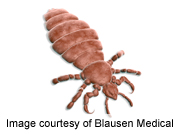- You Might Fare Better If Your Doctor Is Female, Study Finds
- CDC Launches Online ‘Heat Forecaster’ Tool as Another Summer Looms
- Biden Administration Sets Nursing Home Staffing Minimums
- Neosporin Ointment in the Nose Might Be Potent Antibiotic
- Physical Ills Often Plague People With Schizophrenia, Bipolar
- Taking Psilocybin for Depression? Relationship With Therapist Is Key
- Stick to Heimlich Maneuver Not ‘Anti-Choking’ Devices, FDA Says
- Women in the Military at Risk for Low-Weight Babies
- Repeat Blasts Can Damage Soldiers’ Brains, Study Confirms
- Few Young Adults Could Administer Naloxone to Reverse Fentanyl Overdose
Insecticide-Laced Underwear No Match for Lice


Insecticide-treated underwear won’t wipe out lice infestations in homeless shelters, according to a new study.
The strategy initially showed some success, but the lice soon developed resistance to the chemical, the researchers said.
Body lice can spread through direct contact and shared clothing and bedding, and the problem is worsened by overcrowded conditions.
The study, which was published online Dec. 4 in the journal JAMA Dermatology, examined the impact of giving homeless people underwear treated with the insecticide permethrin. Forty participants were given new underwear treated with the insecticide and 33 others received untreated underwear. They were checked 14 and 45 days later.
On day 14, the researchers found that 11 of the 40 people given treated underwear were free of body lice, compared with three of the 33 who received untreated underwear. This difference, however, was no longer evident at day 45, and the body lice showed increasing resistance to the insecticide.
“This trial clearly demonstrates that the use of [insecticide-treated] underwear had the consequence of increasing the percentage of permethrin-resistant body lice in sheltered homeless people,” said study leader Samir Benkouiten, of Aix Marseille University, in France. “These findings lead us to recommend avoiding the use of permethrin to treat body-lice infestations, although implementing new strategies is crucial.”
More information
The U.S. Centers for Disease Control and Prevention has more about body lice.
Source: HealthDay
Copyright © 2024 HealthDay. All rights reserved.










